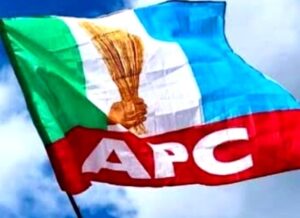Opposition Governors Rethink Defection to APC Amid Political Shifts
Opposition Governors Rethink Defection to APC Amid Political Shifts

Plans by some governors elected under opposition parties to join the ruling All Progressives Congress (APC) may have stalled, as new political calculations and internal party dynamics prompt a reconsideration.
Recent high-profile defections—such as those of Delta State Governor Sheriff Oborevwori, Deputy Governor Monday Onyeme, and former Governor Ifeanyi Okowa from the Peoples Democratic Party (PDP) to the APC—sparked speculation that more opposition governors were preparing to jump ship. APC National Chairman Abdullahi Ganduje had even hinted at a wave of defections to follow.
However, reports suggest that several governors earlier believed to be contemplating defection—such as Peter Mbah (Enugu), Dauda Lawal (Zamfara), Caleb Mutfwang (Plateau), and Ademola Adeleke (Osun)—are now reconsidering.
In Enugu, sources close to Governor Mbah disclosed that the recent influx of former Labour Party members into the PDP had strengthened his political base, possibly guaranteeing his re-election bid. The collapse of Labour Party structures in the state and the perceived disunity within the LP have also reduced pressure on Mbah to seek refuge in the APC.
“The governor has consolidated power. The LP’s internal problems mean Mbah’s second term is less threatened,” a source familiar with the situation said.
In Zamfara, Governor Lawal has firmly dismissed rumours of a possible switch. According to his media aide, Mustafa Kaura, the governor is committed to the PDP and has no intention of abandoning the party or the voters who supported him.
“Governor Lawal remains loyal to the PDP. He’s not planning to defect,” Kaura affirmed.
In Plateau, PDP stalwart and former lawmaker Dachung Bagos said Governor Mutfwang has no alignment with the APC’s ideology, making a defection unlikely.
Meanwhile, in Abia State, Labour Party Governor Alex Otti publicly ruled out any move to the APC. Speaking on Arise TV, Otti said there was no compelling reason to leave the party that brought him to power.
“I’m staying with the Labour Party. The idea that everyone must join the APC is simply not democracy,” Otti said, while emphasizing that he would continue to serve as an opposition leader based on principles.
Osun Governor Ademola Adeleke also debunked reports of his defection at a recent PDP meeting. “I am not joining the APC or any other party. This is fake news. I remain in the PDP,” he declared.
Opposition Voices Push Back on Defection Trend
Amid the defections, leaders of opposition parties have pushed back, arguing that the moves reflect individual ambitions rather than ideological shifts. NNPP’s National Publicity Secretary, Ladipo Johnson, described the defection trend as a survival tactic.
“Joining the APC won’t guarantee electoral success in 2027. If things don’t improve economically and with security, Nigerians will vote based on performance, not party,” he said.
Labour Party’s Obiora Ifoh echoed similar sentiments, noting that the ruling party cannot eliminate opposition voices simply through defections.
On the other hand, Sonny Adenuga, Chairman of the Because Of Our Tomorrow Party, criticized the PDP’s leadership, saying the party’s internal crisis has created an opportunity for the APC to dominate.
“The PDP’s lack of direction is helping Tinubu’s chances. But these defections might open space for a new, ideologically grounded political movement before 2027,” he said.
Dr. Olu Agunloye, Secretary of the Social Democratic Party (SDP), shared a broader concern, suggesting that Nigeria is not heading toward a one-party state but could become a polarized two-party system with APC and SDP as major players.
“Both APC and PDP have disappointed Nigerians. We need a strong, unified opposition front to challenge the status quo,” Agunloye stated.
TRENDING SONGS
 NPMA Appeals to Nigerian Government for Compensation After Lagos Market Fire
NPMA Appeals to Nigerian Government for Compensation After Lagos Market Fire
 Rest Every Four Hours, FRSC Issues Safety Guide for Fasting Motorists
Rest Every Four Hours, FRSC Issues Safety Guide for Fasting Motorists
 NNPC Boss Ojulari Bags UK Energy Institute Fellowship
NNPC Boss Ojulari Bags UK Energy Institute Fellowship
 Shock in Anambra: Bride Disappears Moments Before Wedding
Shock in Anambra: Bride Disappears Moments Before Wedding
 Nigerian Woman Returns ₦330 Million Accidentally Credited to Her Account
Nigerian Woman Returns ₦330 Million Accidentally Credited to Her Account
 APC Don Reach Morocco?’ VeryDarkMan Reacts to Seyi Tinubu Poster
APC Don Reach Morocco?’ VeryDarkMan Reacts to Seyi Tinubu Poster
 Bride Breaks Down in Tears as Wedding Meals Were Kept Secretly While Guests Go Home Hungry
Bride Breaks Down in Tears as Wedding Meals Were Kept Secretly While Guests Go Home Hungry
 Odogwu by Day, Robber by Night: How Marriage Joy Turned Into Tragedy
Odogwu by Day, Robber by Night: How Marriage Joy Turned Into Tragedy
 Nigerian Officials Allegedly Pocket N4–6B Weekly Through Smuggling Cartels at Seme–Badagry Border
Nigerian Officials Allegedly Pocket N4–6B Weekly Through Smuggling Cartels at Seme–Badagry Border
 Ahmad Yerima: Naval Officer to Face No Sanctions After Clash with Wike – Matawalle
Ahmad Yerima: Naval Officer to Face No Sanctions After Clash with Wike – Matawalle
Share this post with your friends on ![]()













